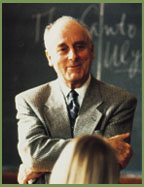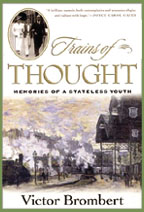April 9, 2003: Reading Room
 Preserving
memories
Preserving
memories
Victor Brombert
tells of a youth interrupted by war
Photo: Brombert uses trains as a metaphor to describe his personal journey.
One of America’s preeminent scholars of French literature, Victor Henri Brombert taught French literature at Princeton for 25 years, attracting hundreds of students to his lectures. At the same time he was writing highly regarded books of literary criticism on Stendhal, Balzac, Flaubert, and Baudelaire.
When he retired in 1999 at the age of 75, he did something different — he wrote about his own past: his pampered childhood in France, his family’s escape from the Nazis to America in 1941, and his experiences in the U.S. Army. “I was not trying to find the meaning of life or anything like that, but to preserve things that might get lost,” such as memories of the “intense love of my parents,” says Brombert, an emeritus professor of romance languages and literatures and comparative literature. His 2002 memoir, Trains of Thought: Memories of a Stateless Youth (W. W. Norton), soon will appear in paperback.
 Brombert
uses trains as a metaphor in the book to describe his personal journey.
“Trains were so important in my youth,” he says. “I loved
the names of trains, the moment of departure, the landscape gliding by,
the brief encounters, the choreography of it all.”
Brombert
uses trains as a metaphor in the book to describe his personal journey.
“Trains were so important in my youth,” he says. “I loved
the names of trains, the moment of departure, the landscape gliding by,
the brief encounters, the choreography of it all.”
Born in Germany, Brombert was the only child of Russian-Jewish émigrés — his father was a successful importer, his mother a champion bridge player. Brombert grew up in Paris, and he takes readers through his privileged and sometimes whimsical youth. He played tennis, flirted with girls, danced to American jazz, and attended a lycée. Brombert calls himself “the little liar, the little thief, the lazy student.”
During his teenage years, he began to experience the horrors of his time. When the Germans came, the Bromberts fled Paris in 1940 before the French surrendered; they eventually made it to Spain, where they bought passage to America on a banana boat. “That boat was packed with 1,200 refugees and took six weeks to sail from Seville to Brooklyn,” he says. In 1942 Brombert was delighted when he was drafted into the American Army and had a way to get back to France. A member of an Army intelligence unit attached to the Second Armored Division, known as Hell on Wheels, he landed on Omaha Beach, fought through Normandy, and “drove into Paris in an Army jeep and saw our old apartment house in the 16th arrondissement,” he says. Later he fought in the Battle of the Bulge.
After the war, he returned to the U.S. and enrolled at Yale, where he earned his B.A. and Ph.D. and taught for 25 years. The final chapter ends as Brombert, who has served as president of the Modern Language Association and as chairman of Princeton’s Council of the Humanities, discovered his scholarly vocation.
Trains of Thought has been called “elegant and absorbing.” Brombert’s memory, wrote the Chronicle of Higher Education, “constantly evokes books, opera, the storehouse of the erudite mind: Zola’s The Human Beast, Anna Karenina, and scores of other classics.”
Brombert, who lives in Princeton, does not plan to write a sequel. “That
would mean I would have to write about the world of academia, and I do
not like academic novels and satires,” he says. ![]()
By Ann Waldron
Ann Waldron is the author of the academic mystery The Princeton Murders.
BOOK SHORTS
 The Career Portfolio Workbook:
Using the Newest Tool in Your Job-Hunting Arsenal to Impress Employers
and Land a Great Job — Frank Satterthwaite ’65 and Gary
D’Orsi (McGraw-Hill). This instructional text shows job seekers how
to create effective résumés and portfolios, which could
include letters from colleagues and clients and performance reviews. Satterthwaite
is a career coach with Career P.E.A.K.S., based in Providence, Rhode Island.
The Career Portfolio Workbook:
Using the Newest Tool in Your Job-Hunting Arsenal to Impress Employers
and Land a Great Job — Frank Satterthwaite ’65 and Gary
D’Orsi (McGraw-Hill). This instructional text shows job seekers how
to create effective résumés and portfolios, which could
include letters from colleagues and clients and performance reviews. Satterthwaite
is a career coach with Career P.E.A.K.S., based in Providence, Rhode Island.
 Living Wild and Domestic:
The Education of a Hunter-Gardener — Robert Kimber ’56 *65
(Lyons). Drawing on his experience as a hunter, fisherman, sheep farmer,
and dog owner, the author reflects on our place in the natural world and
searches for a moral vision that restores some of the wild to our modern
lives. This book raises moral dilemmas, such as how people can justify
keeping domestic pets while destroying the habitats of wild creatures.
Kimber is an author and freelance writer living in Maine.
Living Wild and Domestic:
The Education of a Hunter-Gardener — Robert Kimber ’56 *65
(Lyons). Drawing on his experience as a hunter, fisherman, sheep farmer,
and dog owner, the author reflects on our place in the natural world and
searches for a moral vision that restores some of the wild to our modern
lives. This book raises moral dilemmas, such as how people can justify
keeping domestic pets while destroying the habitats of wild creatures.
Kimber is an author and freelance writer living in Maine.
 The Papers of
Thomas Jefferson, Volume 30: January 1, 1798 to January 31, 1799 —
edited by Barbara B. Oberg (Princeton University Press). The latest volume
of Jefferson’s papers covers part of his term as vice president under
President John Adams and includes letters to his daughters and to Aaron
Burr 1772. Jefferson’s papers are being edited at Princeton, under
the auspices of the history department. The first volume was published
in 1950. Oberg is a senior research historian and lecturer at Princeton.
By Jeanne Alnot ’04
The Papers of
Thomas Jefferson, Volume 30: January 1, 1798 to January 31, 1799 —
edited by Barbara B. Oberg (Princeton University Press). The latest volume
of Jefferson’s papers covers part of his term as vice president under
President John Adams and includes letters to his daughters and to Aaron
Burr 1772. Jefferson’s papers are being edited at Princeton, under
the auspices of the history department. The first volume was published
in 1950. Oberg is a senior research historian and lecturer at Princeton.
By Jeanne Alnot ’04
